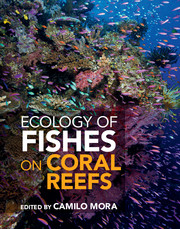Book contents
- Frontmatter
- Contents
- Preface
- Foreword
- List of contributors
- PART I BASIC ECOLOGY
- PART II PATTERNS AND PROCESSES
- PART III HUMAN FINGERPRINTS
- PART IV CONSERVATION
- PART V DEBATES AND PARADIGM SHIFTS
- 23 Is dispersal of larval reef fishes passive?
- 24 Density dependence and independence and the population dynamics of coral reef fishes
- 25 Equilibrial versus non-equilibrial dynamics in coral reef fishes
- 26 Cryptic density dependence: integrating supply-side ecology with population regulation
- 27 Priority effects
- 28 Inverted trophic pyramids
- 29 Shifting baselines in coral reef fishes
- 30 Pluralism explains diversity in the Coral Triangle
- 31 Reef fish biogeographical regions
- 32 Size and sex change
- 33 Quantifying reef fishes: bias in observational approaches
- 34 Seascape ecology of fishes on coral reefs
- 35 The future for coral reef fishes
- 36 Perpetual struggle for conservation in a crowded world and the needed paradigm shift for easing ultimate burdens
- References
- Index
36 - Perpetual struggle for conservation in a crowded world and the needed paradigm shift for easing ultimate burdens
from PART V - DEBATES AND PARADIGM SHIFTS
Published online by Cambridge University Press: 05 May 2015
- Frontmatter
- Contents
- Preface
- Foreword
- List of contributors
- PART I BASIC ECOLOGY
- PART II PATTERNS AND PROCESSES
- PART III HUMAN FINGERPRINTS
- PART IV CONSERVATION
- PART V DEBATES AND PARADIGM SHIFTS
- 23 Is dispersal of larval reef fishes passive?
- 24 Density dependence and independence and the population dynamics of coral reef fishes
- 25 Equilibrial versus non-equilibrial dynamics in coral reef fishes
- 26 Cryptic density dependence: integrating supply-side ecology with population regulation
- 27 Priority effects
- 28 Inverted trophic pyramids
- 29 Shifting baselines in coral reef fishes
- 30 Pluralism explains diversity in the Coral Triangle
- 31 Reef fish biogeographical regions
- 32 Size and sex change
- 33 Quantifying reef fishes: bias in observational approaches
- 34 Seascape ecology of fishes on coral reefs
- 35 The future for coral reef fishes
- 36 Perpetual struggle for conservation in a crowded world and the needed paradigm shift for easing ultimate burdens
- References
- Index
Summary
Coral reefs are in a downward trend despite accelerated efforts for their conservation. This is in much part due to a biased research and conservation focus on the proximal (e.g. overfishing, climate change, pollution, etc.) rather than the ultimate (i.e. an ever-growing and expanding human population) causes of coral reef damage. The expected increase of human populations suggests that proximal stressors will continue, likely exacerbating with each other, and that the current narrow conservation focus will lead to adaptive strategies that will struggle in a perpetual effort to maintain functional ecosystems. A review of MPAs shows, for instance, that the required network of MPAs, in terms of size and connectivity to ensure the viability of coral reef ecosystems, will involve a massive scaling up of protected areas, which will likely be obstructed by limited funding and lack of social and political support and impaired by magnifying threats unlikely to be controlled by MPAs. During the time in which such a network is developed or its expected biological effects become evident, human populations in most tropical countries with coral reefs will have likely doubled. All factors associated with the ongoing decline of coral reefs have human origins, thus I propose that longer-term, more permanent, and perhaps cheaper strategies, to mitigate stressors on coral reefs should include education campaigns to inform people of the social, economic, and environmental consequences of our personal choices regarding child bearing.
Coral reefs are one of the most diverse, socioeconomically important, and threatened ecosystems in the world. Veron [2565] estimated the existence of ~835 species of reef-building corals, which in turn provide home to some 1–9 million other species [2087]. Worldwide, 10% of the human population (~655 million people) live within 100 km of coral reefs [708] and many rely on reefs for the delivery of food, jobs, and revenues at a gross value of over 300 billion annually [380,561,965,1750,1844,2468]. Unfortunately, coral reefs are in a “slippery slope to slime” [1910,1911].
- Type
- Chapter
- Information
- Ecology of Fishes on Coral Reefs , pp. 289 - 296Publisher: Cambridge University PressPrint publication year: 2015
- 4
- Cited by

